
|
|
|
|
|
|
For the first couple of months much of my time was spent working on GLF's newspaper, COME OUT!: A NEWSPAPER BY AND FOR THE GAY COMMUNITY. The front page editorial on the first issue of COME OUT! (November 14, 1969) makes it clear that gay people are no longer content merely to be tolerated. It begins: "COME OUT FOR FREEDOM! COME OUT NOW! POWER TO THE PEOPLE! GAY POWER TO GAY PEOPLE! COME OUT OF THE CLOSET BEFORE THE DOOR IS NAILED SHUT!" Gay power was portrayed in the following terms:
We will not be gay bourgeoisie, searching for the sterile "American dream" of the ivy-covered cottage and the good corporation job, but neither will we tolerate the exclusion of homosexuals from any area of American life." The first issue of COME OUT! reports on the very first demonstration of the Gay Liberation Front, which was held against the Village Voice on 12 September 12 1969. I remember vividly how the article, "The Summer of Gay Power and the Village Voice Exposed!", was written. The two main authors, Mike Brown and Leo Louis Martello, and I were in Martello's apartment. (Leo was a practicing witch, and kept a boa constructor under the bed.) They were having a fiery argument about something or another, and I was sitting at a typewriter in-between them. Mike would yell in my left ear, Leo would yell in my right ear, and I would bang something on the typewriter, which might be a compromise or even something that I myself wanted to say. Well, after a fair amount of words had gotten down on paper, and some revisions had been made, it began to flow quite nicely, and relations became quite amiable as we could see that progress was being made. As the article makes clear, there were two main issues in the demonstration: the Voice's bigotry in its descriptions of gay people, and the Voices's censorship of gay ads. I can remember that some GLF members, despite a lot of radical rhetoric and posturing, were afraid to appear in broad daylight on a homosexual picket line. I know that I felt hesitant myself, despite having been in the antiwar movement from 1965 onwards, with my own battle scars from that struggle. As the article indicates, the demonstration was a great success.
On March 21, 1975, a picket line demonstration was again held against the Village Voice, this time sponsored jointly by the Gay Activist Alliance and Lesbian Feminist Liberation. The issues were essentially the same as they had been back in 1969. GAA and LFL were protesting the Voice's "stereotypical and offensive portrayals of gay people" and the Voice's advertising policy, which rejected many gay ads on the basis of a quota system. I very much miss both GLF and GAA. Who now will lead demonstrations against the anti-gay bigots in the media, in religion, or in politics? [This is the lead article from COME OUT! A Newspaper By and For the Gay Community, vol. 1 no. 1, New York, Nov. 14, 1969. This was the first publication of the New York Gay Liberation Front. The demonstration against the Village Voice was the first militant demonstration of the (post-Stonewall) Gay Liberation Movement.] THE SUMMER OF GAY POWER AND THE VILLAGE VOICE EXPOSED! by COME OUT Staff writers Mike Brown, Michael Tallman, Leo Louis Martello
Letter writer Liscoe mentions many senseless brutalities he saw and feels that the straights will not support Gay Power because of the resentments bred into them. He concludes "But when these people practice their whole concept of a new morality, I hope they can stop to dig the fact that we are people with something to fight for. The age of the scared little queens is gone. Hail Aquarius." Mr. Liscoe's account was far more accurate than the one described below: An article covering the Stonewall Riots appeared in the July 10, 1969 issue of the Village Voice. The article, entitled "Too Much, My Dear" was written by Walter Troy Spencer. Cloyingly cute and contemptuous, Spencer referred to the Great Faggot Rebellion, "queers" "swishes" and "fags" repeatedly. It's all a big joke. His concern was "One Christopher Street bar operator estimates that a single night of the indirect embargo cost him $500 business" and "More subtly disturbing is the question of what sort of friction this situation may have generated between the Village's Sixth Precinct, the First Division (who made the initial raid without telling the precinct - a standard procedure) and the TPF, who had to be called in when things got out of hand." Spencer called the Stonewall "anti-democratic" because of its "members only" policy, puts down the "annoyingly flamboyant and aggressive" Christopher Street cruising, calls the riots an "entertaining floor show," and was bothered because "I sure don't want to have to run some gauntlet every night just to quietly slip into my friendly neighborhood saloon." He does admit that "the fags" have been exploited for a long time, "caught in a squeeze" between crooks and cops.
Compare and contrast the above to the stated principles of the Village Voice, published in the book The Village Voice Reader, edited by David Wolf and Village Voice publisher Edwin Fancher, pub. 1962. Wolf said that those who started the Voice were left cold by pieties of official Liberalism. They envisioned themselves as the Voice of the displaced, disaffected, dissatisfied and the unhappy. The book contained two sympathetic articles on homosexuality by Seymour Krim and David McReynolds, presenting different points of view. Today the Village Voice is basically a Liberal Establishment newspaper with a pretense of being "hip", with just enough offbeat material to titillate the genitals of would be bohemians and plastic hippies, but always, ALWAYS aiming at their basic prejudices. It's considered "hip" to be both "accepting" and "contemptuous" of homosexuals as evidenced by nearly every story they've published recently dealing with the subject.
In the August 7th issue of the Voice, members of Gay Liberation Front placed an ad in the Public Notices section of classifieds. The substance of the ad dealt with requests for articles, photographs, art work, etc. for COME OUT. The lead-in to the ad read "Gay Power to Gay People." Our friendly community monopoly newspaper accepted the ad with payment in full and then before printing simply deleted "Gay Power to Gay People" without the knowledge or consent of G.L.F. At the regular Sunday meeting of G.L.F., general outrage was expressed at the assumed right of the Voice to censor classified ads. The feasibility of an action against the Village Voice was discussed and dismissed on the basis of insufficient evidence. GLF, however, felt that the Village Voice had committed itself to a morally bankrupt policy. Classified ads represent a community service, and are not the newspaper's main income source. Therefore, it should follow that classifieds should be verbally expressive of individuals who are paying for the service. We decided at this point to submit another ad using the word "Gay". The opportunity presented itself again in the issue of September 4. GLF then used the VV Bulletin Board to advertise a dance for Friday night, September 5th, using the lead-in -- Gay Community Dance. Again the ad was accepted when and as presented. Next day the person who placed the ad received a call from VV which explained that it was the policy of VV to refrain from printing obscure words in classifieds and VV thought "Gay" was obscene. When questioned why anyone would consider such a word obscene, the Voice said that the staff had decided "Gay" could be equated with "fuck" and other four-letter words, and that either the ad would have to be changed or the ad could not be printed. Since "homosexual" was also not acceptable, and since GLF wanted the ad for the dance placed, we accepted their only admissible substitute, "homophile" (which is a genteel bastard word not included in most dictionaries). The Village Voice also promised a written explanation of their opposition to the words "Gay" and "homosexual." GLF "deviously" planned to utilize this explanation as the basis for a civil rights suit (Civil Rights Law of 1964: denial of rights of free speech by a public or quasi-public institution). But true to tradition, the Voice promised more than it delivered, and we never received such a written explanation. Undeterred, GLF began proceedings with our lawyers for suit in Federal Court. At this point we finally met Ed Fancher, when we were forced to deliver a letter stating our proposed action to his home (since Mr. Fancher was never available in his office). At this time we asked to speak to him about the Voice Classified policy. He refused to discuss the issue with us (as he had once before by phone) and mumbled that we should not have done such an outrageous thing as to have come to his place of residence, while he politely but firmly closed the door in our faces. While GLF considers itself open to reason, it also reserves the right to take appropriate action based on the reality of a given situation. Clearly, we felt Fancher had closed the door on dialogue. At the general meeting of September 7th, a course of action was decided, a course of action which included a picket line and other street actions. The day Gay Power laid itself on the line for the first time started at 9 a.m. on September 12, 1969, with much communal coffee and even more communal confusion. Ed Fancher arrived at 10 a.m., received a proclamation of our grievances, and promptly disappeared through the door into VV bureaucracy. At 4:30 p.m., during the peak of the demonstration, a member of GLF submitted a classified ad saying "The Gay Liberation Front sends love to all Gay men and women in the homosexual community." The picture outside the Voice was characterized by a chanting picket line, a supply of 5000 leaflets being rapidly exhausted, and large numbers of people signing the petition charging the Voice with discrimination. At this point, Howard Smith emerged from the door of the Village Voice (to boos from the crowd) and requested three representatives from GLF to "meet with Mr. Fancher". Once inside and upstairs, the representatives encountered a cry of outrage that GLF has chosen the Village Voice as a target (sooo liberal we are). The suggestion was made that we negotiate the three points in dispute 1) changing classified ads without knowledge or consent of purchaser, 2) use of the words "Gay" and "homosexual" in classifieds, and 3) the contemptuous attitude of the Village Voice toward the Gay Community. GLF explained that the two issues involving classified ad policy were not negotiable and that the substance of the paper should be of legitimate concern to a responsible publisher. Ed Fancher replied that the Village Voice exercised no censorship of its articles, and that if a writer wanted to say derogatory things about faggots, he could not in good conscience stop him. Fancher also said that we had no right to tamper with "freedom of the press." This GLF accepted with the absolute understanding that Gay Power has the right to return and oppose anything the Village Voice staff chooses to include in the paper. On the Classified Ads policy he conceded completely. He said that not only would the Voice not alter Ads after payment, but that in Classified Ads the words "Gay" and "homosexual" per se were no longer issues. One of the GLF representatives in the upstairs office stepped to the window facing Seventh Avenue and flashed the V for Victory sign to the waiting crowd below. WE HAD WON! |
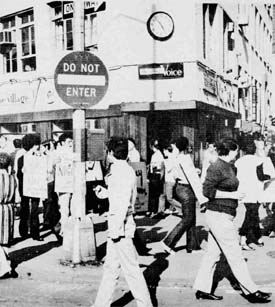 Members of the Gay Libertaion Front on the march, as reported in their newspaper COME OUT!
Members of the Gay Libertaion Front on the march, as reported in their newspaper COME OUT!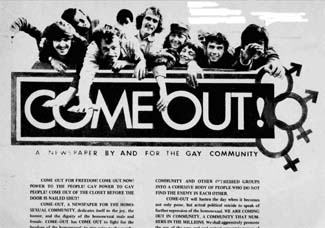 The first issue of COME OUT
The first issue of COME OUT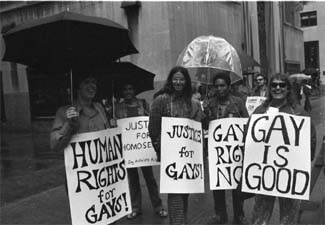 A Gay Activists Alliance Demonstration
A Gay Activists Alliance Demonstration 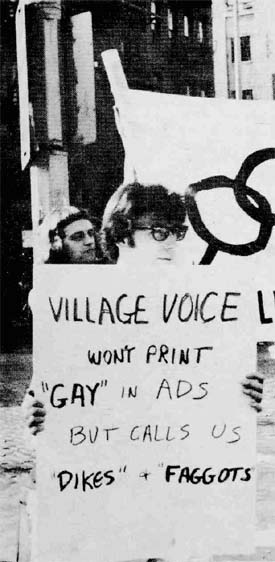 A Gay Liberation Front demonstrator in the 1969 protest against the Village Voice
A Gay Liberation Front demonstrator in the 1969 protest against the Village Voice John Lauritsen
John Lauritsen 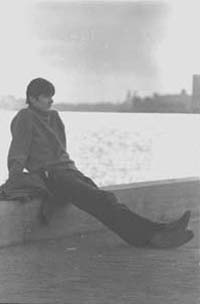 John Lauritsen in the late summer of 1969 at Manhattan's Morton Street Pier
on the Hudson River
John Lauritsen in the late summer of 1969 at Manhattan's Morton Street Pier
on the Hudson River